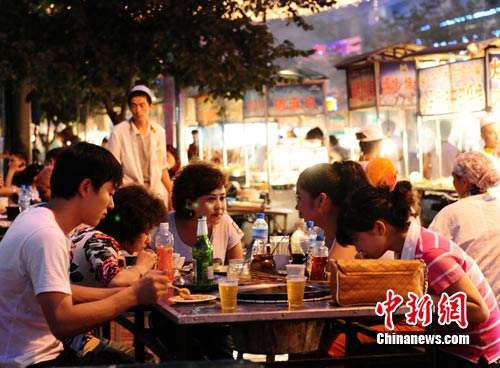


(Photo/Chinanews.com)
Beijing's "night economy" is lighting up as the Chinese capital pushes to further upgrade its consumption market, after nighttime consumption proved to be a highlight during China's recently concluded four-day Labor Day holiday.
Sanlitun, home to some of Beijing's most exciting places to eat, drink and party, saw a noticeable rise in visitor flow at night during the holiday. The place was crowded, especially after 8:00 pm every night, when people often had to wait outside restaurants to get a table.
According to statistics released by a food court in Beijing's Shunyi district on May 5, the visitor headcount per day hit 58,800 over the Labor Day holiday, up 144.7 percent from a year ago thanks to the opening of its night market. The single-day revenue of the food court also rose 34.2 percent to 6.59 million yuan ($978,660).
Statistics from Chinese local service company Eleme also indicated massive changes in Beijing's catering industry brought about by the night economy.
It showed that dining times were growing later and longer. Food orders placed between 10:00 pm and 1:00 am increased, and general orders placed within this period also rose nearly 6 percent.
The statistics from the Beijing Municipal Commercial Bureau also reported active consumption in business districts such as Wangfujing, Sanlitun and Qingnianlu between 6:00 pm and 6:00 am the next day. Catering consumption in these places was up 51.3 percent. Moreover, 24 shopping malls witnessed an almost 40-percent growth in visitor flow.
In the 2019 government work report, Beijing proposed to stimulate another round of consumption upgrading. To promote the night economy and encourage major business districts to extend their opening hours is one pivotal method. The government will also grant maximum subsidies of 5 million yuan to food courts to lift their image and improve their general planning.
Night economy has become a whole new engine that drives consumption growth. Statistics showed that business sales at night in Shanghai reached 62 percent of daytime sales, and nighttime consumption made up 55 percent of the service sector's revenue in Guangzhou.
 Fire brigade in Shanghai holds group wedding
Fire brigade in Shanghai holds group wedding Tourists enjoy ice sculptures in Datan Town, north China
Tourists enjoy ice sculptures in Datan Town, north China Sunset scenery of Dayan Pagoda in Xi'an
Sunset scenery of Dayan Pagoda in Xi'an Tourists have fun at scenic spot in Nanlong Town, NW China
Tourists have fun at scenic spot in Nanlong Town, NW China Harbin attracts tourists by making best use of ice in winter
Harbin attracts tourists by making best use of ice in winter In pics: FIS Alpine Ski Women's World Cup Slalom
In pics: FIS Alpine Ski Women's World Cup Slalom Black-necked cranes rest at reservoir in Lhunzhub County, Lhasa
Black-necked cranes rest at reservoir in Lhunzhub County, Lhasa China's FAST telescope will be available to foreign scientists in April
China's FAST telescope will be available to foreign scientists in April "She power" plays indispensable role in poverty alleviation
"She power" plays indispensable role in poverty alleviation Top 10 world news events of People's Daily in 2020
Top 10 world news events of People's Daily in 2020 Top 10 China news events of People's Daily in 2020
Top 10 China news events of People's Daily in 2020 Top 10 media buzzwords of 2020
Top 10 media buzzwords of 2020 Year-ender:10 major tourism stories of 2020
Year-ender:10 major tourism stories of 2020 No interference in Venezuelan issues
No interference in Venezuelan issues
 Biz prepares for trade spat
Biz prepares for trade spat
 Broadcasting Continent
Broadcasting Continent Australia wins Chinese CEOs as US loses
Australia wins Chinese CEOs as US loses